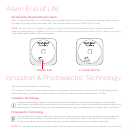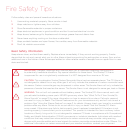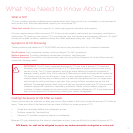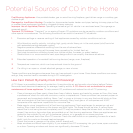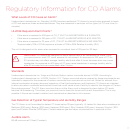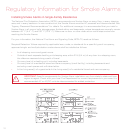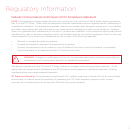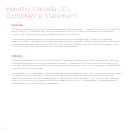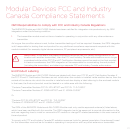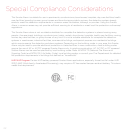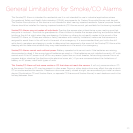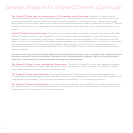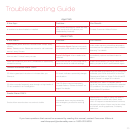24
General Limitations for Smoke/CO Alarms (Continued)
This Smoke/CO Alarm may not sense smoke or CO on another level of the home. Example: This alarm device,
installed on the second floor, may not sense smoke or CO in the basement. For this reason, one alarm device may
not give adequate early warning. Recommended minimum protection is one alarm device in every sleeping area,
every bedroom, and on every level of your home. Some experts recommend battery powered Smoke and CO Alarms
be used in conjunction with interconnected AC powered Smoke Alarms. For details, see “About Smoke Alarms” for
details.
Smoke/CO Alarms may not be heard. The alarm horn loudness meets or exceeds current UL standards of 85 dB at
10 feet (3 meters). However, if the Smoke/CO Alarm is installed outside the bedroom, it may not wake up a sound
sleeper or one who has recently used drugs or has been drinking alcoholic beverages. This is especially true if the
door is closed or only partly open. Even persons who are awake may not hear the alarm horn if the sound is blocked
by distance or closed doors. Noise from traffic, stereo, radio, television, air conditioner, or other appliances may
also prevent alert persons from hearing the alarm horn. This Smoke/CO Alarm is not intended for people who are
hearing impaired.
The Alarm may not have time to alarm before the fire itself causes damage, injury, or death, since smoke from some
fires may not reach the unit immediately. Examples of this include persons smoking in bed, children playing with
matches, or fires caused by violent explosions resulting from escaping gas.
This Smoke/CO Alarm is not a substitute for life insurance. Though this Smoke/CO Alarm warns against increasing
CO levels or the presence of smoke, BRK Brands, Inc. does not warrant or imply in any way that they will protect
lives. Homeowners and renters must still insure their lives.
This Smoke/CO Alarm has a limited life. Although this Smoke/CO Alarm and all of its parts have passed many
stringent tests and are designed to be as reliable as possible, any of these parts could fail at any time. Therefore, you
must test this device weekly. The unit should be replaced immediately if it is not operating properly.
This Smoke/CO Alarm is not foolproof. Like all other electronic devices, this Smoke/CO Alarm has limitations. It can
only detect smoke or CO that reaches the sensors. It may not give early warning of the source of smoke or CO is in
a remote part of the home, away from the alarm device.



